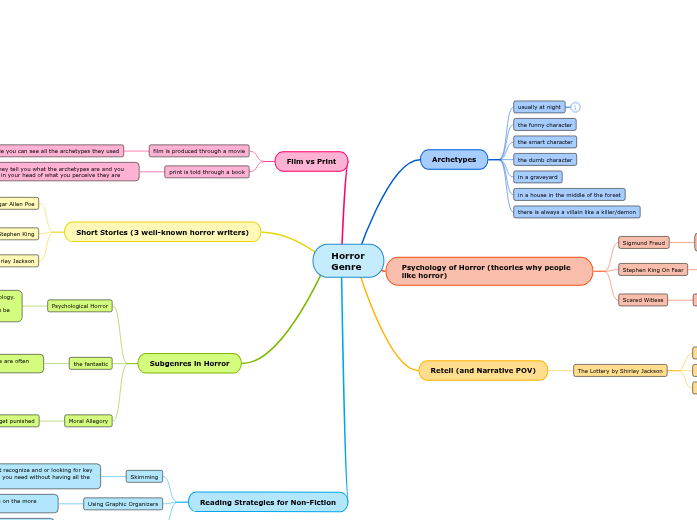Horror Genre
Archetypes
usually at night
the funny character
the smart character
the dumb character
in a graveyard
in a house in the middle of the forest
there is always a villain like a killer/demon
Psychology of Horror (theories why people like horror)
Sigmund Freud
horror creates strong tense emotions and they build up until there is a sense of relief
that is called "Catharsis"
Stephen King On Fear
horror makes us blind
we know that things are not real but yet we still think there is a slight chance of it happening so we go the extra mile to be safe
Scared Witless
young people engage in "mastery testing"
young people want to prove to themselves and to others that they can sit through an entire movie without closing their eyes to feel brave and to show others they are not weak
Retell (and Narrative POV)
The Lottery by Shirley Jackson
this story is about a town with a dark tradition
told in third person omniscient POV
i retold the story in fisrt person POV from Mr. Summers POV
Film vs Print
film is produced through a movie
in the movie you can see all the archetypes they used
you can hear the scary music and the screams
print is told through a book
in the books they tell you what the archetypes are and you envision them in your head of what you perceive they are
they rely on vocabulary to make you feel scared
Short Stories (3 well-known horror writers)
The Tell Tale Heart by Edgar Allen Poe
is told by an unnamed narrator who endeavors to convince the reader of his sanity, while describing a murder he committed
I am the Doorway by Stephen King
told from the point of view of a crippled former astronaut. he provides an account of the terrifying change he undergoes after being exposed to some sort of contagion during a space mission to venus
The Lottery by Shirley Jackson
is about a small town with a dark tradition
Subgenres in Horror
Psychological Horror
this genre focuses on deviant or abnormal human psychology. the "monster" is at the center of the story and often represents some aspects of ourselves, the "monster" can be supernatural or human
silence of the lambs
psycho
cape fear
the fantastic
the source of horror comes from not knowing, we are often told about a supernatural occurrence indirectly
the others
the blair witch project
the dome
Moral Allegory
you break a rule, you get punished
the omen
most fairytales
the exorcist
Reading Strategies for Non-Fiction
Skimming
looking for things you do not recognize and or looking for key terms to get the information you need without having all the little useless details
Using Graphic Organizers
take notes while reading can help you focus on the more important details
Activating Prior Knowledge
trying to make a connection between the topic of your reading and what you already know about the topic
